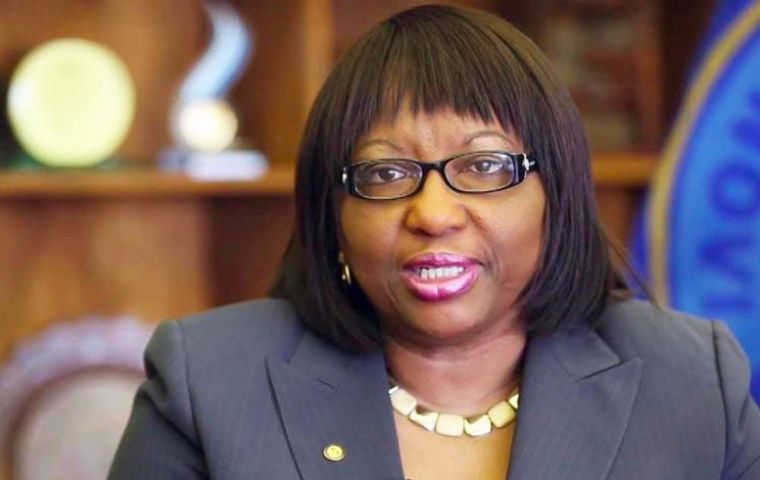MercoPress. South Atlantic News Agency
PAHO set out to reverse low vaccination rates against COVID-19
 “There is no recovery path for any country as long as its neighbors remain vulnerable and the variants circulate and multiply,” Etienne insisted.
“There is no recovery path for any country as long as its neighbors remain vulnerable and the variants circulate and multiply,” Etienne insisted. The Pan American Health Organization (PAHO) Wednesday reported that less than 20% of people in Latin America and the Caribbean have been fully immunized against COVID-19 and announced actions will be taken to reverse that situation.
More than 1.3 million new cases had been reported last week, inclusing some 19,000 deaths, PAHO underscored.
“We must banish the idea that vaccine inequity is a problem for some countries and not others, and instead work together to find solutions for all countries,” PAHO head Carissa Etienne said.
Contagions continue to rise in Canada, Mexico and the United States, as well as in countries such as Honduras, Belize and El Salvador, where the increase was estimated at 30%.
Etienne also highlighted a “general decline” in infections in the Andean region and Brazil, with “substantial drops” in Colombia, Bolivia, Paraguay and Uruguay.
She also announced PAHO will begin to offer doses against covid-19 through its revolving fund, created in 1977 to supply affordable vaccines against different diseases and medical supplies to 41 countries and territories in the region. The revolving fund would be an alternative to the COVAX distribution mechanism, promoted by the World Health Organization (WHO) and the Gavi alliance.
Already 20 countries have expressed interest in acquiring coronavirus vaccines through this fund, Etienne revealed. The PAHO director explained that the fund will benefit the countries of the region that lack “the resources and negotiating power” to secure supply.
Meanwhile, PAHO Deputy Director Jarbas Barbosa explained that they already have vaccine offers for the last quarter of this year and for 2022, and pointed out that the expectation was to start sending the doses “as of October next” although negotiations with both countries and producers were sill in progress.
“This new initiative will make available tens of millions of COVID-19 vaccine doses beyond the 20 percent that COVAX offers, and it will complement bilateral deals and other existing avenues for countries to access vaccines,” Etienne said in a virtual news conference.
Deaths related to COVID-19 are rising in nearly every country in Central America, including a 30 percent increase in El Salvador.
In Cuba, which has recently faced the most widespread protests since Fidel Castro’s 1959 revolution, the situation remains “very difficult” as transmission is very active, according to Ciro Ugarte, PAHO’s director of health emergencies. “I think we will be able to mobilise solidarity and the support for Cuba, also from the humanitarian side,” Ugarte said. He added that PAHO had already sent medical supplies.
Meanwhile, the US government said Wednesday that it will deliver nearly 837,000 Pfizer vaccines to Caribbean nations as the region with limited resources struggles with a surge in COVID-19 cases amid violent anti-vaccine protests. The Bahamas will receive 397,000 doses followed by Trinidad and Tobago with more than 305,000 doses. Barbados will receive 70,200 doses, while 35,100 are slated for St Vincent and the Grenadines, 17,550 for Antigua and 11,700 for St Kitts and Nevis.
“The Biden-Harris administration’s highest priority in the Americas today is managing and ending the COVID pandemic and contributing to equitable recovery,” said National Security Council Senior Director for the Western Hemisphere Juan González.
The Caribbean region has reported more than 1.29 million cases and more than 16,000 deaths, with some 10.7 million people vaccinated so far, according to the Trinidad-based Caribbean Public Health Agency.
Among the hardest-hit Caribbean nations is Haiti, which on July 14 received its first vaccine shipment since the pandemic began — 500,000 doses of the Moderna vaccine donated by the US via the United Nations’ COVAX programme for low-income countries. The country of more than 11 million people has reported 20,400 confirmed cases and 575 deaths, although experts believe those numbers are severely underreported given a widespread lack of testing.
The announcement by the US government came amid recent anti-vaccine protests in Guyana, Antigua and St Vincent and the Grenadines, whose prime minister was hit in the head with a rock last week and was briefly hospitalised.
“There is no recovery path for any country as long as its neighbors remain vulnerable and the variants circulate and multiply,” Etienne insisted.




Top Comments
Disclaimer & comment rulesCommenting for this story is now closed.
If you have a Facebook account, become a fan and comment on our Facebook Page!